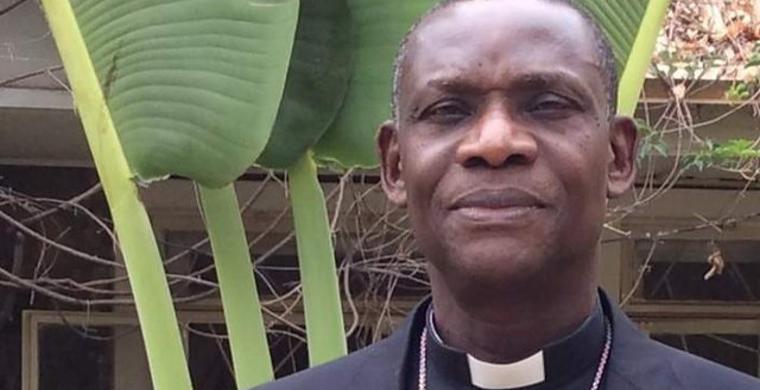Looking outwards with the gospel
By Chris Sugden,
Evangelicals Now,
Mar 25, 2017
In February, the Secretary General of the Anglican Communion, a Nigerian Archbishop, Josiah Idowu-Fearon, addressed the General Synod of the Church of England, "Growth and Decline in the Anglican Communion -- 1980 to the Present', edited by David Goodhew of Cranmer Hall, Durham was launched at a conference.
Archbishop Fearon clarified that the term "Anglican Communion" referred to churches which find their common roots through the Church of England and its tradition to the witness and mission of the apostolic church. "The very word 'anglicana' implies a living tradition of faith in the gospel as this church has received it... from Augustine of Canterbury......to renewal in the English Reformation and beyond." "They feel they owe so much of their faith, in human terms, to the faithful giving of Christians in the Church of England over the centuries."
Some in General Synod have held that the Church of England would do better if it severed its ties with the churches of the Anglican Communion. They regard the position of many of those churches on marriage and sexuality as primitive and embarrassing the witness of the Church of England to a secular society on the side of history. Following the vote in Synod on the Bishops' Report, one BBC interviewee said that the Church of England was for the people of England and should therefore be in line with the prevailing culture of its people. This liberal nativism forgets that biblical Christian theology has no national particularity with one theology for the English and another for the Nigerian.
Archbishop Fearon tackled this head on. "Our internal life as the Body of Christ continues to be animated by the Spirit of God, as we expend ourselves outward on behalf of the lives of others." In the Church of England, "vigour was kindled and then took form in looking outward. The theological and social debates in the CofE in the 19th and early 20th centuries were given their creative life through the engagement of missionary bishops and leaders in their midst...the route to the Church of England's internal health is, as with any church, through her self-expenditure for the sake of the world." He encouraged Synod to "take your gifts and make them the centre of your local energies: evangelism, pastoral care, ecumenical passion and acuity, resources and diocesan labour. Share them with your entire sister churches of the Anglican Communion, not as a favour, but as the very source of your own life, which it is."
Archbishop Fearon identified the criminalisation of homosexuality as the most pressing issue around human sexuality in Africa, which the Anglican Primates again stood firmly against in January 2016, along with homophobic prejudice and violence. He identified their stand and that of the English House of Bishops as "simply the position of Lambeth 1.10" of 1998.
Was he subtly encouraging those who might be seen to focus particularly on their own sense of hurt rather to look outwards with all the servants of Christ to serve others around the world? If such people claim to be baptised Christians and to be fully welcome in the Church, would they not evidence their claim by their outward looking service around the world to those facing economic displacement, political uncertainty, grinding poverty, persecution and violence which he name checked as the challenges facing the Communion?
Growth and Decline in the Anglican Communion gives brief histories of a number of Anglican churches with statistics of church membership, attendance and affiliation. In his review on Anglican Mainstream, Andrew Symes welcomes that Goodhew counters the theory that the Church will inevitably decline where secular culture is strong, citing Singapore, Sydney and London as examples of Anglican growth. Neither does demographic growth explain church growth, since while Nigeria and South Africa have seen similar growth in population, Anglicanism has exploded in Nigeria but remained static in South Africa. "Social action on its own does not tend to feed into numerical growth...churches which focus on social action and make minimal efforts in evangelism struggle to grow." (p.25).
In the studies of churches in Nigeria, Ghana, North and South America, South Africa, England and Australia, Symes sees a link between theological liberalism and church decline, and between theological conviction, spiritual vibrancy, evangelistic zeal and church growth. But these links are not explored in depth. The volume's most serious omission in his view is any mention of the significant renewal and reform movements of GAFCON and the Global South, which challenge those parts of the Anglican Communion aligned with Western secularism and call for mission and church growth based on confidence in the biblical gospel.
https://www.e-n.org.uk/2017/04/world-news/looking-outwards-with-the-gospel/
http://anglicanmainstream.org/looking-outwards-with-the-gospel/
Canon Dr Chris Sugden, a retired Anglican clergyman, is married with three married children and seven grandchildren. He is chairman of the Trustees of Anglican Mainstream and secretary of the Oxford Centre for Religion and Public Life. He holds canonries in Jos, Nigeria and Sunyani, Ghana. Following ministry in India he was part of the international leadership team which established the Oxford Centre for Mission Studies.














